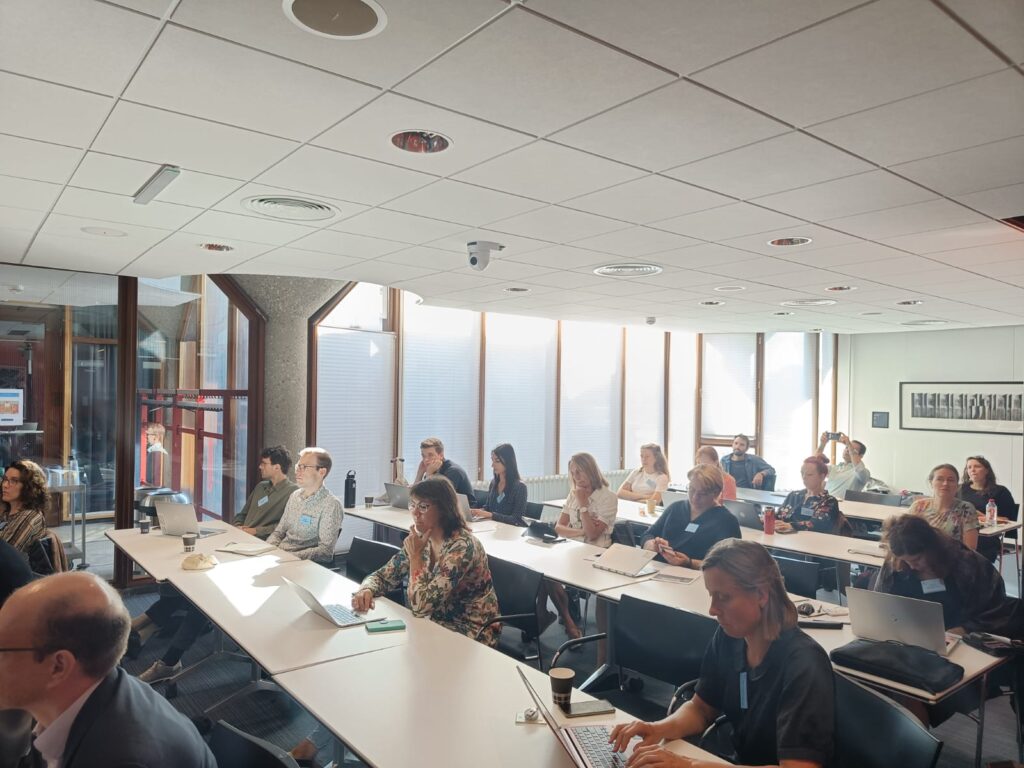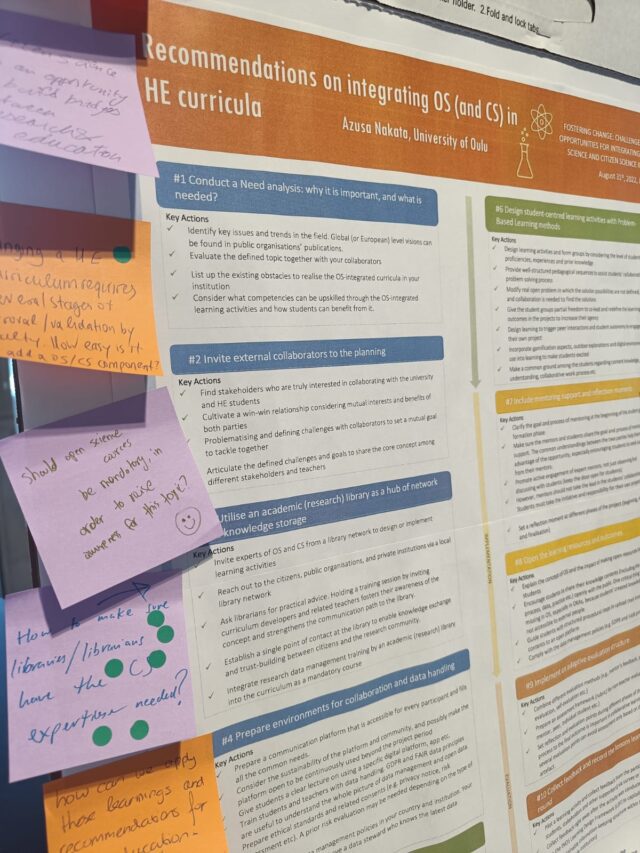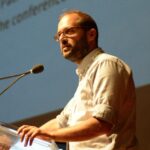The INOS Project Closure – Integrating Open and Citizen Science into Higher Education
For the past three years, LIBER has participated in the Erasmus+ funded project INOS (Integrating Open and Citizen Science in Higher Education Learning Approaches). The project has produced outputs to help facilitate the integration of Open and Citizen Science into teaching and learning at HEIs, using active learning pedagogies that will help increase the social impact of Higher Education Institutions (HEIs) and better situate their role in current demands for civic engagement, societal impact and equal learning opportunities. Research libraries, with their role as community hubs and centres of teaching and learning, are central to the vision of INOS, and will be instrumental in the sustainability of project findings.
Fostering Change – Final INOS Event at Leiden University Library
On 31st August 2022, INOS project partners joined together with local Open Education and Open Science advocates for the event Fostering Change: Challenges and Opportunities of Integrating Open and Citizen Science in Higher Education, held at Leiden University Library. The event was a final opportunity for the INOS project to share outputs and determine how these results will be sustained in future activities.
INOS project partners Julieta Barrenechea (Euskampus Fundazioa/University of Bordeaux), Amalia De Götzen (Aalborg University), Katerina Zourou (Web2Learn) and Azusa Nakata (University of Oulu) discussed project recommendations on the social role of HEIs regarding OS, guides on fostering Open Innovation at universities, the role of Citizen Science in academia-society relations and student-centred active learning approaches.

View their slides on Zenodo here.
Participants then took part in a Knowledge Café, giving them the opportunity to interact with INOS project partners, learn more about their work and debate and discuss project outputs. Hosted in the Leiden University Library Centre for Digital Scholarship, the Knowledge Cafe gave participants the chance to give their views on each topic. Here is a selection of participants’ thoughts, questions and feedback:
‘Open Science as content and Open Science as an educational method – there are many opportunities’
‘How can we create convenient and easily accessible platforms to share materials from OS/CS/OI activities?’
‘Citizen Science as a new service of academic libraries?’

To close, the event looked beyond INOS to the initiatives and projects that are continuing the work of integrating OS/CS into higher education. Margaret Gold delivered an inspiring keynote speech outlining the potted history of the Citizen Science Lab at Leiden University, and how to create enabling environments within institutions to support the development of OS/CS approaches. INOS partners then delivered some practical examples of how they were implementing the lessons learnt during the project in their institutions. Simon Worthington (LIBER Citizen Science Working Group) and Alisa Martek (CeOS_SE Project) showcased how Open and Citizen Science are being furthered in research libraries (through the Working Groups’ Guide for Citizen Science in Research Libraries) and in Southeastern Europe (through the work of the CeOS_SE Project).
View their slides on Zenodo here. The recordings of Session 1 and Session 2 are available online. With thanks to our hosts and technical personnel from the University of Leiden.
Recording Session 1
Recording Session 2
Integrating OS/CS into HEIs – The role of research libraries
LIBER participated in the INOS project to bring the perspective and knowledge of the research library community to the consortium – which included two LIBER Member libraries, Tallinn University, Estonia and University of Oulu, Finland. Enabling Open Science is a major priority for LIBER, as is promoting innovative scholarly communication, fostering digital skills and services, and engaging with world-class e-infrastructure. Below are a selection of INOS outputs that aim to help research libraries embrace their role as enablers of Open and Citizen Science in HEIs and build capacity for HEI library staff on OS/CS skills.
- A learning design framework for improving the learning potential of OS activities by means of active learning approaches
- Short guide: “Engaging academia and citizens in open knowledge activities”
- Report on upskilling HE academic and library staff and students through academia and citizens’ OS with a focus on skills and innovation potential.
- Report on two vision-building workshop with key OS/CS stakeholders
- Roadmap for capacity building on OS and CS for research libraries
- Report on Stakeholders’ Consultation
- Vision & Policy recommendations for OS/CS integration in HEIs
INOS and the LIBER network
LIBER participates in international projects such as INOS to connect and represent research libraries in Europe. LIBER Vice President and former head of the Innovative Scholarly Communication Steering Committee, Giannis Tsakonas, explains the value of LIBER’s participation in INOS for the research library community.

‘The involvement of LIBER in the INOS project gave us the opportunity to see how we can create the vital space for open science and innovation to flourish in the academic environment. Understanding how we can embed open science, open innovation and citizen science in the academic learning environment was crucial, as we were in need of evidence regarding what works in the field. INOS helped us understand the challenges in making Open Science not just visible, but connected to society. We have learned by its examples and methodologies and we carry its work in other relevant projects, such as CeOS_SE, proving that good ideas can be sustained in practice.’
The future of INOS
To further disseminate INOS project outputs, project members will present at the Scivil Citizen Science Networking Day on the 15th November 2022, discussing recommendations for the implementation of OS/CS in HEI curricula and beyond. Furthermore, LIBER will take the lessons learned in INOS forward into other European projects, such as CeOS_SE (Citizen-enhanced Open Science in Southestern Europe). You can read more about all the projects that LIBER participates in on our designated project pages.
Related News